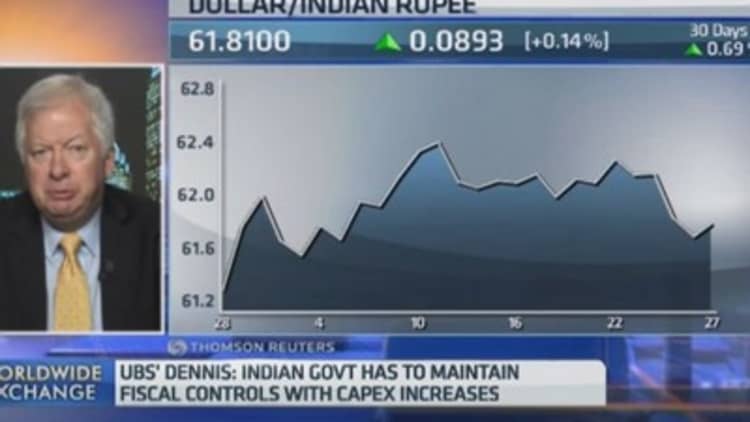Given the choice to invest in China or India in 2013, the average investor would have more than likely opted for China.
Ask the same investor today, and the answer would most likely be India. But before they jump in, they may want to wait for this weekend.
India's growth is rebounding, its current account deficit is narrowing and inflation has come down thanks to lower oil prices.
Plus investors like new Indian Prime Minister Narendra Modi's message: reform the economy, build infrastructure and help India grow. For months, markets have been steadily rising on hopes that Modi will deliver the goods. The Bombay Sensex is up around 40 percent over the past one year.
Read MoreHopes for a new, more open India aren't dead yet
On Saturday, investors will tune in to see if Modi delivers the reforms he has promised to citizens and investors as he unveils India's annual budget. There's a lot at stake.
"I think it is very important ... what it is going to do is set the program of fiscal policy going forward, in particular the balance of government spending versus tax changes," Geoff Dennis, head of global emerging market strategy at UBS, told CNBC's "Worldwide Exchange" on Friday. "It's going to set the tone on the sort of fiscal policy you're going to have, with structural reform in mind."
For those reasons, market participants are calling Saturday's budget debut the most important economic event of the year for India.

Since winning election in May 2014, Modi has been quite active—cracking the whip on business leaders, advocating for bilateral trade with countries like the United States and Japan, and also looking for ways to clamp down on corruption. Modi is even known for calling executives in the morning to ensure they are at work doing their job and not slacking off.
Still, Modi hasn't provided the details behind how he plans to improve some of India's most painfully visible challenges—like poverty, pollution and lack of infrastructure. Those three factors, analysts say, will continue to hamper India's growth and outlook. In the annual budget, Modi is expected to introduce programs that let the private sector come in and build India's next wave of growth.
"Modi was elected on the promise of reform, but it hasn't been well-articulated," said Sam Gupta, CEO of Grand Trunk Capital.
Read More What rout? Oil on track for best month since 2009
BNP Paribas told clients this week that the "government should signal its commitment to reviving investments by increased public spending, (especially) focusing on roads, railways, coal and power."
Another focus for investors will be foreign direct investment into India. Last month, President Barack Obama visited India and brought several American CEOs with him, including Bob Iger of Walt Disney and Indra Nooyi of PepsiCo, among others, to talk about how the two largest democracies in the world can work together to improve trade and business. Modi responded by rolling out the sort of diplomatic red carpet for the president that is rarely seen for visiting heads of state anywhere.
While all that was seen as a positive, questions remain around how much any of it will contribute to India's future growth.
"A thrust on (capital expenditures) and reforms agenda will boost sentiment among investors and corporates. Key is how soon it translates into actual growth pickup," the UBS India team wrote to clients.
As a longer-term investor—we don't expect all the issues to be solved in this budget—its only one part of the puzzle, but we do want to see Modi moving forward with his reform.Sam GuptaCEO, Grand Trunk Capital
A nuclear trade deal that could lead to an export boom in the energy sector was announced while President Obama was in India—Modi is expected to provide details at Saturday's budget announcement.
Monetary policy will also be a likely topic of discussion. Lower oil prices have been a big win for India, which is a net oil importer. As inflation moves lower, that may give Reserve Bank of India Gov. Raghuram Rajan the ability to cut rates further in 2015.
UBS points out that Rajan has been highlighting for a while that the RBI will be watching for high-quality fiscal consolidation as a factor for determining whether to undertake further monetary easing.
Read MorePutin slammed as 'naked king'...but ruble rallies
When taking a step back and looking at India's economic picture, it's hard for many emerging market investors to not get excited. Increasingly, India stands alone as a viable option among the big emerging nations—the so-called BRIC nations of Brazil, Russia, India and China.
China's growth is slowing, Brazil is suffering from lower oil prices and a falling currency, and Russia is in open crisis mode as it's hit by the oil selloff, Western sanctions and new expenses stemming from its war in Ukraine.
But a lot is riding on Modi and his Bharatiya Janata Party to introduce the right policies in the annual budget and ensure that the details behind each policy are articulated.
"As a longer-term investor—we don't expect all the issues to be solved in this budget—it's only one part of the puzzle, but we do want to see Modi moving forward with his reform," said Gupta.



